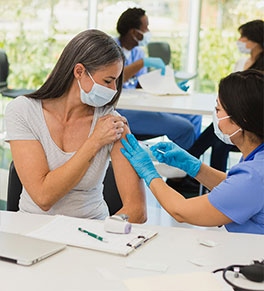Are COVID-19 booster shots worth it?

“If we all boost, we can generate a good amount of protection for the entire population," says UCI Health infectious disease expert Susan S. Huang, MD. "You can think of these boosters collectively as a population shield."
COVID-19 cases are on the rise again in Orange County and across most of California and the nation, coinciding with the relaxation of masking and social distancing restrictions after the winter surge ended.
Infectious disease specialists were expecting at least a small wave of new cases would follow this spring. The increase in new infections now has many people wondering whether they should get a second booster shot of the COVID-19 vaccine.
The answer is yes, if you are eligible, according to Dr. Susan S. Huang, medical director of epidemiology and infection prevention for UCI Health.
“COVID-19 vaccine boosters can further enhance or restore protection that might have waned over time after your primary series vaccination,” she says.
Huang explains why getting a COVID-19 booster now is worth it and answers commonly asked questions about the vaccine.
Who is eligible for a spring booster?
You are eligible for a second COVID-19 booster if you:
- Are 50 years of age or older and your first booster was at least four months ago
- Are moderately or severely immunocompromised, 12 years of age or older, and your first booster was at least four months ago
Why should I get a second booster?
To answer this question fully, we need to understand what the COVID-19 boosters do. First, they protect you from a severe infection that could cause hospitalization or death. Second, they protect against mild to moderate infections.
Studies show us that the primary series mRNA vaccines and any booster we get thereafter are very protective. Even one booster shot gets your protection levels up to nearly 100% against the most severe consequences and also shields you against mild and moderate infections.
A second booster is recommended for high-risk individuals to ensure a greater degree of ongoing protection. Age and immunocompromised states are major risk factors for severe COVID-19 infection. We want to prevent any chance of infection in these people.
Why get a booster for mild or moderate infections?
There are many reasons. Maybe you want to avoid getting long-haul COVID. Maybe you travel a lot and have an increased risk for exposure. Maybe you are at a busy time in your life and can’t afford to get sick, even with a mild infection.
Maybe you don’t want to infect those around you who are at higher risk like grandparents and parents. Maybe you or a family member are undergoing cancer therapy or taking medications that affect your immune system. Almost all of us know someone who needs to be protected against serious infection.
It also turns out that the booster is also really important to shield us from getting infected in the first place then causing more cases to spread in the community. The more eligible people who get the spring booster, the more protected we all are — and the less likely we are to spread COVID-19 to those who are highly vulnerable.
Why get a booster if it lasts only a few months?
To answer this question, we need to understand what is normal for your body to do when it gets a vaccine. Your body creates two armies. One is the memory army, the cellular army that lasts inside your body and is there to prevent severe disease. When the infection comes. it fights a huge battle to prevent severe illness and death.
But your body has a second army and that's the one we consider the shield — your antibody response — which helps prevent you from becoming infected in the first place. The first time you get a vaccine or get infected, that antibody response naturally goes up very high then it naturally comes down. That is normal.
Your body then says, “You know what, it takes a lot of energy to maintain these armies. I’m going to maintain the memory one, that’s going to last forever. And I'm going to keep the other one high enough for as long as I think it's going to be experiencing this particular infection."
When you get the second vaccine or a second infection, your body says, “Oh, I'm seeing this infection again, maybe it's more common than I think." The antibody level is boosted, but when that level comes back down, it's not quite as low. The set point is higher because the body thinks maybe this infection is more common. And when you get yet another dose, that boosts your antibody level again and the set point a little higher still.
Who makes the second booster?
Currently, the U.S. Food and Drug Administration (FDA) has approved only booster shots made by Moderna or Pfizer-BioNTech. For children ages 12 through 17, only the Pfizer-BioNTech vaccine has been authorized. None have been approved for younger children.
Are side effects worse than those from the original vaccine?
So far, reactions reported after getting a booster shot are similar to those after the two-dose or single-dose primary shots. Fever, headache, fatigue and pain at the injection site are the most commonly reported side effects.
Overall, most side effects are mild to moderate and last only a few days. Data show that serious side effects remain rare.
What's the bottom line on boosters?
We have a very smart bodies. If we all boost, we as a community can generate a good amount of protection for the entire population — a good amount of herd immunity — to protect us from a very severe wave like the ones we saw last summer and winter.
You can think of these boosters collectively as a population shield.
Related stories
Explore further
Browse more blog posts by topic.




